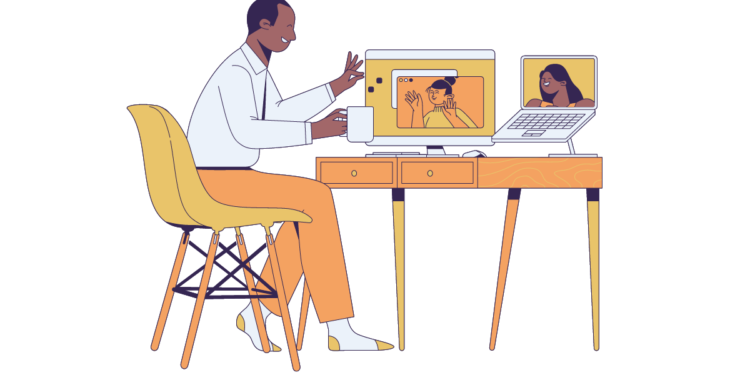The easiest option is to send everyone to four sides. But only if we are talking about a second cousin from Tyumen, whom you saw earlier in the second grade, but you will never see the next time. Fortunately, I have adequate relatives. There will be no creepy stories about how my beloved aunt wanted to bring the police and the Committee for the Protection of Children’s Rights on me because their dad is engaged in dubious affairs, there will be no. But I also went through the process of protecting my right to work the way I like. And he didn’t quarrel with his family. I share my experience on how to convince others that remote work is the norm.
People DON’T UNDERSTAND WHAT YOU DO
The easiest option is to send everyone to four sides. But only if we are talking about a second cousin from Tyumen, whom you saw earlier in the second grade, but you will never see the next time. But to break off relations with really close people? Such to yourself.
To convince relatives that remote work is normal, you need to understand the reasons for the negativity.
Non-digital people think that working from home is such an easy pastime. They imagine a warm house, a sofa, a TV with serials and all that. Moreover, it is with such expectations that some come to freelancing. And when a hard bummer happens, they go to the other extreme. Like, freelancing is a scam. Anyone who normally earns freelancing is either lying or engaged in some kind of muddy schemes.
In fact, remote work is just like any other job. Only at home. You have a schedule, deadlines, working relationships, and more. Especially if you work in-house. That is, as a full-time employee, but not in the office.
What to do?
Treat the problem like a marketer. There is target audience, there are psychological characteristics, there is an expected effect. Choose the tools, run the tests, study the results. And don’t expect results right now.
Explain
Find a good example that will be clear to a person far from marketing.
I explained the essence of content marketing to my uncle using plastic windows as an example. He bought them for a new apartment on the eve of our conversation and imperceptibly went through all the stages of the sales funnel. I found an article on the blog of one of the window manufacturers, how three- and five-chamber double-glazed windows differ. Then I watched reviews of KBE and Rehau profiles on YouTube.
By appealing to the interlocutor’s personal experience, you speak their language. You are easier to understand.
Show to them your remote work
When I first started writing texts, I literally showed my work to my mother live. He conducted a tour of the search results, explained the difference between advertisements and non-advertising ads, why companies should be higher in the search, showed what keywords are, why articles on sites are needed. For someone who is in the subject, it sounds strange, but then the explanation was quite satisfying. After watching the clicking of the keyboard for half an hour, my mother decided that my work was boring =)
When talking about your work with a non-digital interlocutor, simplify the complex, do not bother with the detail.
People Understand Remote Work WRONGLY
There are many myths about telecommuting. Especially among those who know a little more about the Internet than a “confident user”. I heard a lot of these from a distant relative who owns an online store. At work, he came across remote workers of the cheapest price segment. Copywriters “thirty rubles for a thousand characters”, admins of groups on VKontakte, whom the language does not dare to call SMS and other specialists of a similar level. He looked at me accordingly.
Here are a few myths I heard from him:
- The freelancer works from morning to evening without days off. In the evening he got up, fell into bed, fell asleep. In the morning again at the computer.
- A freelancer is a coven. The work is there or it isn’t. The refrigerator is always empty.
- Freelancers earn very little. If 20 thousand a month comes out, then good.
Well, freelancers do not know how, and Internet marketing does not work. Let’s leave these “self-evident” facts out of the equation.
What to do?
Break patterns.
Be financially independent
This is generally one of the most difficult stages in life, and for a freelancer – especially a beginner – even more so. I started living separately at the age of 19, got married at 24. My daughter was born when I was 25. And for a year after that I was in graduate school, doing odd jobs like working as a courier and mowing the grass. The conversations that happened then that it would be necessary to find a “normal” job, now I consider it quite natural.
But I worked, I studied, I messed up, I got better. Money gradually became more. When signs of prosperity appeared in the family, questions about the format of work disappeared completely.
For those who want to grow professionally and financially, TexTerra has a TeachLine training center . Practitioners will help develop skills, gain new experience or master a new profession. All lessons are held online, 1-2 times a week. Usually in the evenings. Can be combined with work.
Find time for loved ones
For me personally, freelancing is not a reason to build a wall between myself and my family. If there are no critical deadlines, I have a standard five-day week. Weekends on Saturday and Sunday. Convenient for work, because this is how most partners work. And there is also free time for the family.
People DON’T ACCEPT WHAT YOU DO
Sometimes I communicate with people who live somewhere in their own universe. The digital universe does not correlate with their worldview. You explain the essence – they argue, deduce philosophical concepts in the spirit of “only freelancers in the country, but the factories are standing.” A friend of mine is still convinced that a copywriter, a hit-hiker and a downshifter are one person. Although we have been friends for 14 years.
Speak CA language
Sometimes I feel that the interlocutor is not interested / needs to dive into the details of the work. Or all his interest is ostentatious. Here is approximately.
I used to say that I do journalism. And I tried not to develop the topic and not raise more questions of the work or those that could lead to it.
Now I have every right to introduce myself as an entrepreneur. IP status allows. By the way, IP is also a pension (haha, very funny) and medical insurance. A couple of arguments against the argument “There will be no pension.”
After all, freelancing may very well be the start of something more serious. And these are completely different competencies, a completely different format of work and completely different money.





